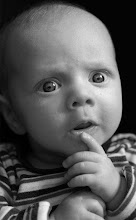"Prufrock" and "Magi" give us two very different Eliot poems. There seems little that's similar in the style, the tone, the voice, and so forth, yet both are dramatic monologues, which made me start to ponder how Eliot interprets the monologue and makes it his own.
I've long-thought that the joy and the frustration of reading "Prufrock" is its fractured style. The monologue comes from the voice of one who fears maintaining a complete thought, and who agonizes over what he can not or will not do. The poem reads like a stutter--a beautiful, orchestrated stutter--as we're thrown headlong into Prufrock's question-wrestling without a strong sense of what the question might be.
"Magi" gives us a speaker who looks back on an experience that he is now able to better understand, and thus the style is more coherent. As in "Prufrock," we still see Eliot's depth of allusion (thought, in this case, he seems to limit himself to Biblical/Christian references, which again gives the feeling of containment and a stable narrative).
But for all their apparent differences, both speakers ultimately share an ability to understand their experiences, and the Magi's question, "were we led all that way for/ Birth or Death?" seems as overwhelming as Prufrock's.
Given the depth of Eliot's literary knowledge, I assume he writes dramatic monologues with Browning in mind. "Porphyria's Lover" and the Duke who shows his last duchess's portrait seem to act with great (though misguided) conviction, but I wonder if Eliot were not more influenced by other, less certain characters, like those in "The Bishop Order His Tomb" or "Caliban Upon Setebos."
Questioning seems fundamental to an Eliot persona, a core human trait that even the most diverse of characters share.
Χαίρετε, νικῶμεν
12 years ago

No comments:
Post a Comment